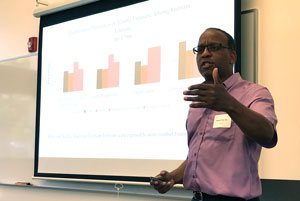
Ethnoracial Disparities in Traumatic Stress and its Consequences

On Friday, May 24, Nnamdi Pole, PhD delivered "Ethnoracial Disparities in Traumatic Stress and its Consequences," a talk that explored the factors that contribute towards demographic differences in rates of post-traumatic stress disorder (PTSD). In his talk, Pole stressed that the analyses of PTSD diagnoses and symptoms, and of cross-cultural differences, describe trends rather than the experience of any particular member of an ethnic group.
"One of the principal questions I want to ask is, 'Does race affect risk of exposure to trauma?'", said Pole during the talk. A quick glance at certain studies suggests that this is the case, as surveys of the U.S. population found that people who identify as Black or African American were exposed to more violence than those who identify as White, and people who identify as Black/African American or Latinx/Hispanic were exposed to more childhood trauma than those who identify as non-hispanic White. Surveys of American soldiers who served in the Vietnam War also suggested that Black and Native American veterans were exposed to more combat trauma than White veterans.
However, as Pole says, "quantifying trauma can be difficult." Another method of attempting to measure trauma is by surveying self-reported levels of PTSD in populations likely to face trauma. Surveys of both active duty and retired police officers find that Black and Latinx police officers are more likely to report experiencing symptoms of PTSD, and surveys of the general United States population find that Black people are diagnosed with PTSD at higher rates than White people, and that Asian Americans are diagnosed at significantly lower rates than White people.
"Exposure to trauma alone does not explain elevated PTSD rates," Pole says. "The culture and gender we come from modifies how much we feel we can react to trauma." Culture affects emotional self-reporting, facial behavior, and, to a lesser extent, physiological responses, and studies have attempted to measure continuums of emotional expressiveness across cultures.
Much of Pole's talk addressed the real-world applications of the higher levels of PTSD among people who identify as Black or Latinx, and the simultaneous mis-diagnosing that occurs in a mental healthcare system that often treats Whiteness as the norm. "People of color often feel that the treatments given to them don't make a lot of sense culturally," says Pole. Studies have shown that doctors consistently under-diagnose PTSD in Black people, as well as mis-diagnose PTSD as depression or another psychotic disorder.
"A patient may react very differently when encountering a doctor of a different race," Pole explains. In a study of African Americans with PTSD, a group mostly white doctors diagnosed African Americans based on their impressions of the patients at a rate of 6% after meeting them in person. The same patients were diagnosed at a rate of 43% based upon a questionnaire without an in-person meeting. In addition to being under- and mis-diagnosed, "Blacks with PTSD were 33.8% less likely than Whites to seek professional PTSD treatment," Pole says.
"Despite our common humanity, our demographic differences carry different risk for trauma exposure and trauma pathology," Pole concluded. Despite these differences in risk, Pole is hopeful that clinicians can bridge demographic gaps. "Thoughtful cultural adaptations of evidence-based treatments are a promising way to meet the needs of ethno-racially diverse clients."
Pole's talk was the third faculty forum event of the 2018-2019 academic year. The first, held in September, featured full-time faculty members Stephanie Chen, PhD, Mary Clarke, PhD, and Kristin Dempsey, EdD, and core faculty member Raymond Buscemi, PsyD. Dempsey held a second event in November to explain the advantages of the Professional Clinical Counselor (PCC) license.
Learn more about the Wright Institute's Master of Counseling Psychology program.
Learn more about the Wright Institute's Doctor of Clinical Psychology (Psy.D.) program.
